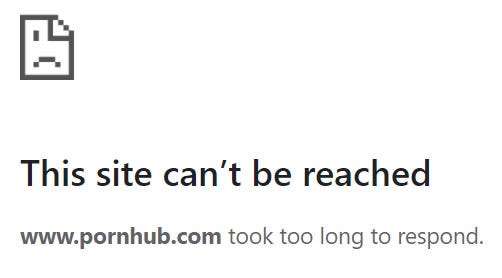You sort of have a right to PornHub
OK, you probably shouldn't be watching that much but that should be up to you
Myanmar's military restricted access to the internet this week after it seized power and declared a one-year state of emergency over the country.
The situation there is really more complex than I can adequately discuss but the outage does stray into something I have written about in the past: Takedowns in the Philippines under the Cybercrime Prevention Act.
A BETTER ROUNDUP OF INITIAL REPORTS HERE: 🇲🇲 24 hours later: So, it was a coup.
Engineer Pierre Tito Galla, of the ICT civil rights group Democracy.Net.PH and one of my go-to people to talk to about rights online, says on his Facebook page:
“Soooo, what's happening in Myanmar won't ever happen here? Na the government can never order the blocking of websites without court intervention? Yung government can never order the blocking of websites just because they can? awww, aren't you cute. /s”
He is right, though, in that government can and has done it, although so far only in a piecemeal manner, and against sites that are difficult to defend.
You will probably have noticed—and also by now have found a workaround—that you can't access PornHub on a PLDT or Smart connection.
I'm not sure if people on Globe or SKY can access the site, I'm not super invested in it, but I think it's safe to assume that they can't.
In the 2014 Supreme Court decision on petitions questioning the constitutionality of parts of the Cybercrime Prevention Act, the court said that a government agency cannot block or takedown a website on its own and without a court order.
The court said then that to allow the executive branch to decide on its own what should and shouldn't be online would be “a restriction on the freedom of expression over cyberspace.”
That doesn't mean that the National Telecommunications Commission has not done it anyway under a 2014 memorandum. The NTC can send Internet Service Providers lists of "identified pornographic websites" named by the Inter-Agency Council Against Child Pornography "for immediate blocking of access or filtering."
READ: Civil rights group: Blocking adult sites may have been illegal
Ramon Isberto, head of the public affairs group of Smart Communications, said in 2017 that the NTC had issued an order to block PornHub, RedTube and XTube and other sites. "We receive orders from the NTC from time to time, depending on requests from the [Philippine National Police]," he said then.
“When it comes to blocking websites, it is as if Disini vs. [Secretary of Justice] doesn't exist,” Galla said this week, referring to the 2014 Supreme Court decision.
“That's why the NTC has been the first responder to requests by government to block websites, instead of the courts. The NTC merely has to send an order, by the power vested upon it as the telecommunications regulator, to the telcos and ISPs to block or filter websites in the request,” he says, adding companies cannot be blamed for complying.
“The fault lies with the NTC. It's the NTC's fault for not refusing the government, to tell government to attach the valid court orders in their requests for takedown,” he says.
RELATED: ISPs ordered to explain failure to block child porn sites
It is a little difficult to object to the blocking of porn sites. After all, who — aside, obviously, from child pornographers — doesn't want to get rid of child pornography.
But what it can do by a simple order to block a site for an arguably good reason, it can also use for any reason it can argue to be good: Like blocking websites it deems “ a danger to the state.”
It would be little different from confiscating “subversive documents” decades after the Anti-Subversion Law was repealed or summoning people who criticize government’s purchase of a new jet for top officials.
Consider also that President Rodrigo Duterte in September lashed out at Facebook in response to its takedown of military-linked pages because of “coordinated inauthentic behavior” and, I suspect, because of bad advice from his hangers-on.
“What would be the point of allowing you to continue if you can't help us? We are not advocating mass destruction, we are not advocating massacre. It's a fight of ideas,” he said, as he painted the takedown of pages on a social media network owned by private company as censorship of content.
“Is there life after Facebook?” he said, thinking aloud. After a few attempts by his supporters to move to other social networking sites, it seems there isn't life after Facebook yet, although many Duterte supporters have found a home and an audience on TikTok.
Facebook's community standards define “inauthentic behavior” as using Facebook or Instagram assets to “mislead people or Facebook” on their identity, purpose or origin, or on the popularity of a page or post, or "to evade enforcement under our community standards", but the president's spokesman insisted then that it was an issue of freedom of speech.
Interestingly, the Disini in Disini vs. SOJ had this to say about the Facebook takedowns:
“Coordinated... is OK. If it’s inauthentic, then you could theoretically be violating the Cybercrime Prevention Act,” Disini said. “In the law, we have these two things, computer-related fraud and computer-related forgery.”
The furor over the pro-government Facebook pages has died down but not before people linked to the administration tried to paint it as part of global conspiracy against the government. A conspiracy theory that they spread on, as it happens, Facebook.
Would the government block large sections of the internet? Probably not. Could it if it wanted to? Your browser knows the answer to that.




